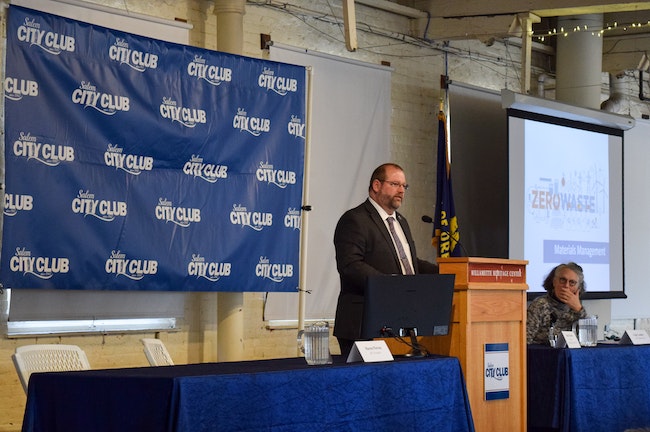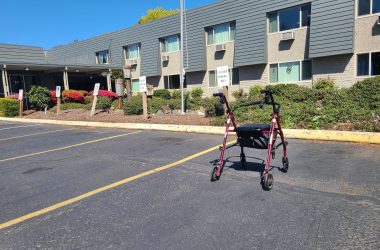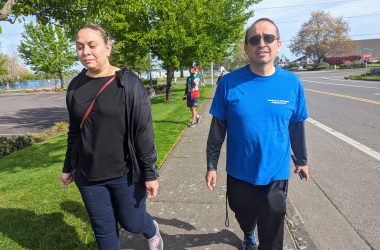 Brian May talks about Covanta Marion at the Salem City Club on Friday, Feb. 21. (Saphara Harrell/Salem Reporter)
Brian May talks about Covanta Marion at the Salem City Club on Friday, Feb. 21. (Saphara Harrell/Salem Reporter)
The Covanta Marion garbage burner isn’t as bad a polluter as its been made out to be, Marion County officials contend.
Brian Nicholas, with Marion County Public Works, presented a 45-minute long slideshow to a crowd of Salem City Club members on Friday, refuting what he said were common myths he’s heard about the energy-to-waste facility in Brooks.
One slide labeled “myth” read: Covanta is the only waste processor listed in the state Department of Environmental Quality’s “top 20” facility emissions report. Covanta Marion was Oregon’s 19th top emitter of greenhouse gas in 2018, according to DEQ.
The following slide, labeled “fact,” refuted that claim, saying two landfills are also on that list. They are the Columbia Ridge landfill in Arlington that takes Portland’s garbage and the Lane County Short Mountain Landfill.
“All the counties use the landfill as a primary disposal system,” Nicholas said. “It’s unfair to say landfills aren’t polluters.”
The Covanta facility isn’t the only place Marion County residents are sending their garbage, with only 60% is going to the incinerator. Most of the rest – 103,000 tons – goes to the Coffin Butte landfill, Nicholas said.
He said Marion County residents produce 400 pounds more waste per capita each year than the state average.
Nicholas cited the benefits of garbage incineration as disposing of medical waste, destroying evidence collected in criminal cases, offsetting CO2 and avoiding methane generation.
He said the tradeoffs include emitting carbon, disposing of ash and producing expensive electricity.
Nicholas said if electricity isn’t generated at Covanta, it has to come from somewhere else.
“But if you didn’t produce that 13 megawatts, that electricity is going to come from either a gas or coal fired powerplant and… it’s going to create more emissions. It’s going to create a total carbon footprint,” Nicholas said.
He said solar farms are at capacity in the county and hydroelectric power is tapped.
Currently, legislation is in the works to provide the Brooks facility renewable status, which would allow the incinerator to sell some of its electricity at a premium.
State Rep. Brian Clem spoke briefly at Friday’s presentation and said if Covanta decides to sue the state over renewable energy credits it was allegedly granted in 2010, the company would win.
He said he plans to propose an amendment that would give the renewable energy certificates to Marion County.
“I’m going to try and work with these renewable energy certificates to find a way to fund zero waste,” Clem said.
Nicholas said landfills are currently given renewable tax credits through the state. Those facilities are given credits for producing biogas, he said. Biogas accounts for less than 1% of renewables in that program, according to Nicholas’ presentation.
If the legislation is approved, Nicholas said waste-to-energy would account for less than a percent of the renewable portfolio.
One slide presented the “myth” that Covanta Marion is the largest source of pollution in Marion County.
Nicholas used data from a 2014 Environmental Protection Agency Emissions Inventory to show vehicles and wildfires produce more emissions than the incinerator.
He went on to list the different pollutants the incinerator releases. All of them are lower than DEQ limits, Nicholas said.
Cars account for a majority of greenhouse gas emissions in Salem, according to the city’s 2016 greenhouse gas inventory.
Brian May, director of the county Environmental Services Department, said the county, which has been vocal about its goal to get residents to reduce waste down to zero, instead is seeing more garbage disposed each year.
During a question period, one man asked May what Covanta’s profit margins are.
May said he didn’t know.
“That’s strange since you want renewable,” the man said. “You don’t know how much they’re making?”
May said the renewable energy credits would bring the county back up to a funding level it hasn’t been at for three years.
Correction: State Rep. Brian Clem plans to amend HB 4049 to award all the renewable energy credits to Marion County. An earlier version misstated that.
Have a tip? Contact reporter Saphara Harrell at 503-549-6250, [email protected] or @daisysaphara.









